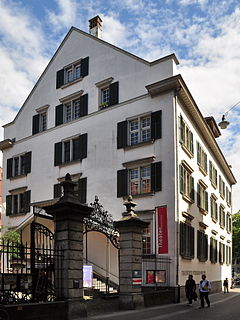 W
WIsraelitische Cultusgemeinde Zürich, commonly shortened to ICZ, is a Jewish community organized as an unified parish in the Swiss city of Zürich. Consisting of about 2,500 members, ICZ is the largest Jewish community in Switzerland. The community provides the Synagoge Löwenstrasse in Zürich-City, a community center and the largest Jewish library at its seat in Zürich-Enge, and two cemeteries.
 W
WThe Pestalozzi-Bibliothek Zürich (PBZ) is the public Library City Zurich. It operates a total of 14 distributed in various neighborhoods libraries. The headquarters is located at the Zähringerstrasse 17 in Zurich Old town, situated a few steps from Zentralbibliothek Zürich. Very high attendance is also the library when Zürich Oerlikon railway station. As City Library the PBZ financed primarily through contributions from the city. The sponsorship is founded in 1896 Association Pestalozzi Society in Zurich. The Pestalozzi library has nearly 60,000 registered customers.
 W
WPestalozzianum was named after the Swiss education pioneer Johann Heinrich Pestalozzi. Between 1875 and 2002 it was a foundation based in Zürich, with the objective to promote the school teacher's instruction and postgraduate training. In 2003 it was renamed in Stiftung Pestalozzianum as its education-oriented objectives were integrated in the new model of university-like colleges (Fachhochschule) which were introduced in Switzerland in 2002.
 W
WStaatsarchiv Zürich, formally the Staatsarchiv des Kantons Zürich, are the state archives of the Swiss Canton of Zürich and its legal predecessors, in particular the former city republic of Zürich.
 W
WSukkulenten-Sammlung Zürich, literally succulent plant collection of the city of Zürich, is a botanical garden in the Swiss municipality of Zürich. It also houses a botanic library, a herbarium and the International Organizations for Succulent Plant Research (IOS).
 W
WThe Swiss Social Archives in Zurich is a historical archive, an academic library, a collection of documentation and a research facility specialising in social issues and social movements. The Swiss Confederation recognizes the archives as the country's leading research facility for social issues and social movements. The Social Archives run their own research endowment fund, the Ellen Rifkin Hill Foundation. The SSA play an important role in communicating scholarship to the broader community. They have convened several exhibitions, published essay collections on Swiss social history and conduct lecture series, presentations and information sessions. The archives work with Swiss secondary and tertiary educational institutions, archives and libraries and with similar institutions abroad. The SSA are a founding member of the International Association of Labour History Institutions (IALHI).
 W
WZentralbibliothek Zürich is the main library of both the city and the University of Zurich, housed in the Predigerkloster, the former Black Friars' abbey, in the old town's Rathaus quarter. It was founded in 1914 by a merger of the former cantonal and city libraries. Its history ultimately goes back to the Stiftsbibliothek of the Grossmünster abbey, first attested in 1259. Much of the abbey's library was lost in the Swiss Reformation, especially in an incident of book burning on 14 September 1525, reducing it to a total inventory of 470 volumes. From 1532, Konrad Pellikan (1478–1556) began rebuilding the Stiftsbibliothek, especially with the purchase of Zwingli's private library, and the library catalogue in 1551 lists 770 volumes. The city library had been established in 1634, and its policy to allow access only to citizens of Zurich led to disputes with the University, which led to the establishment of a cantonal library in 1835, built from some 3,500 volumes with 14,000 titles of the Stiftsbibliothek, some 340 volumes of the recent University Library and some 1,700 volumes of the Gymnasiumsbibliothek.